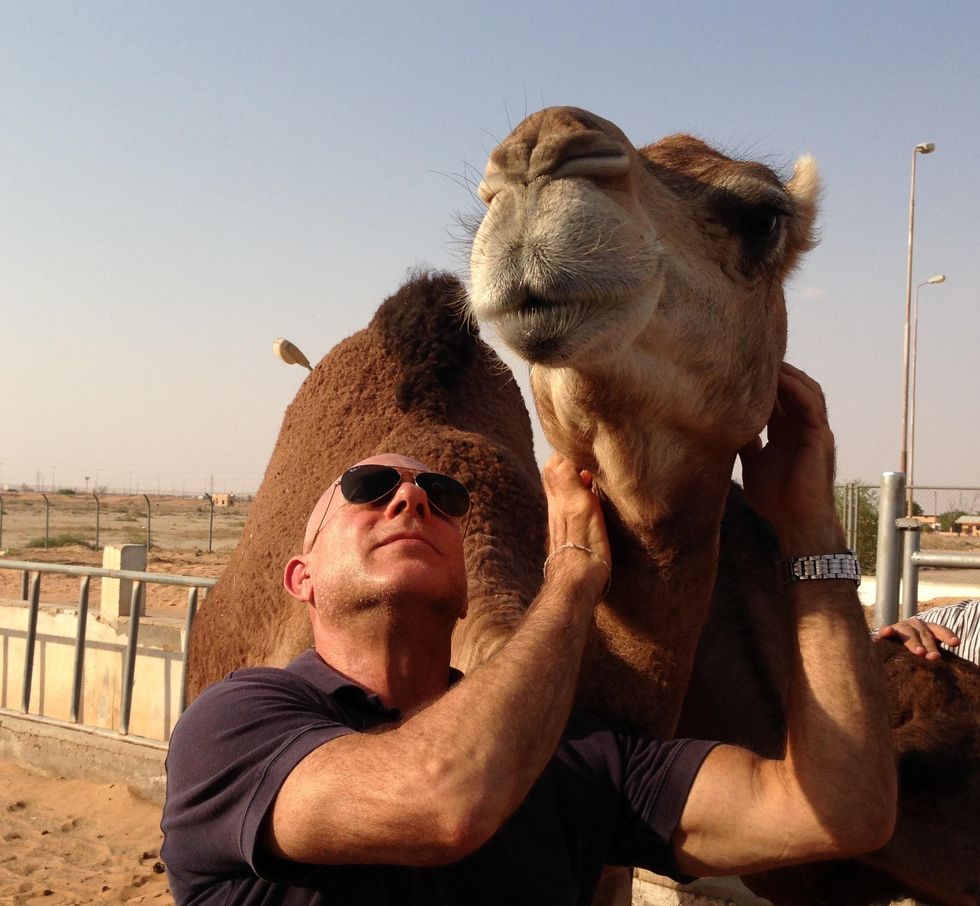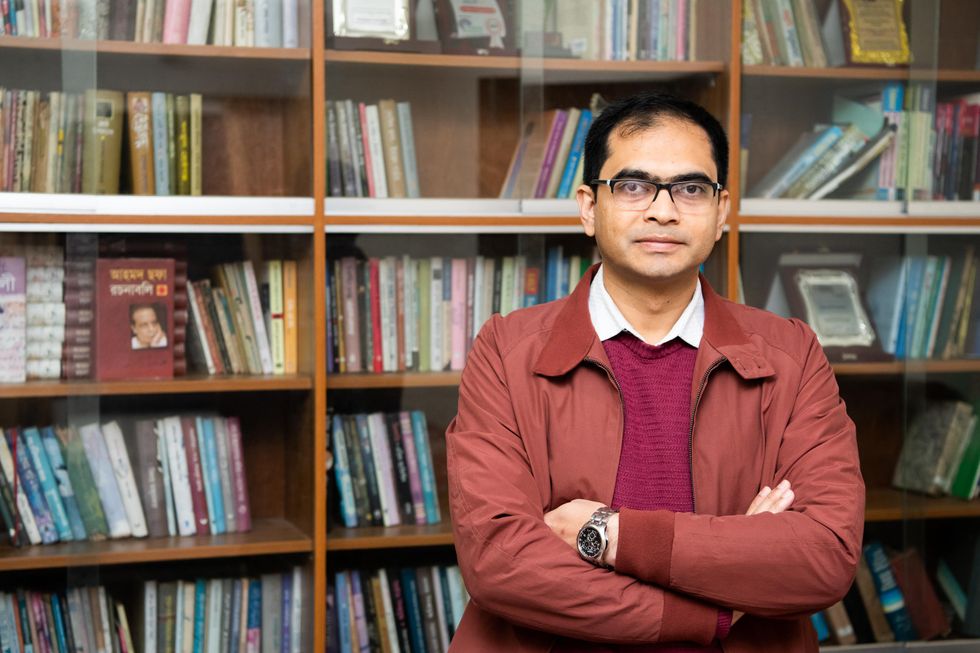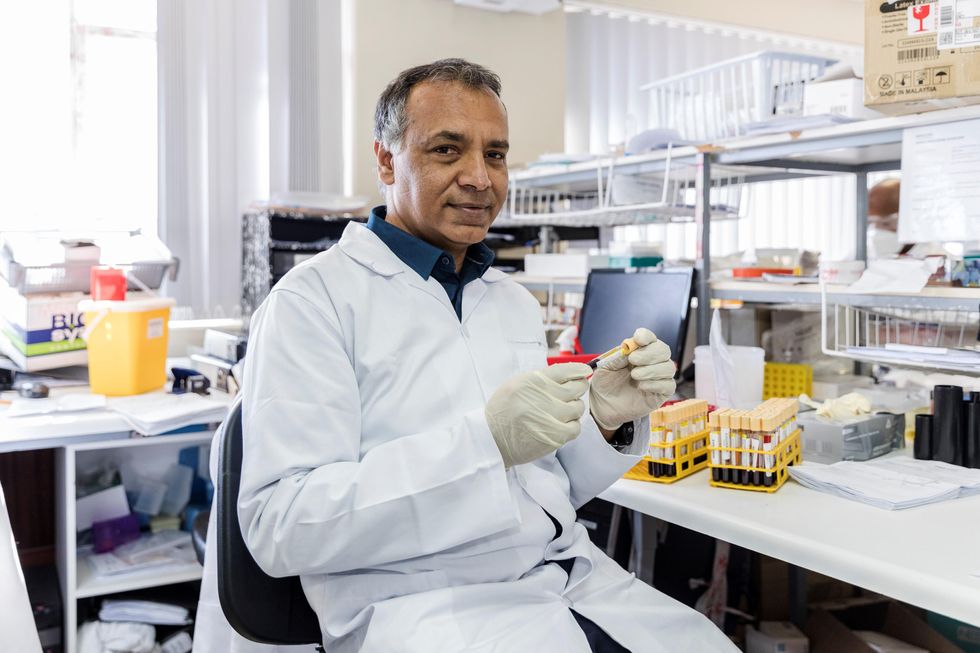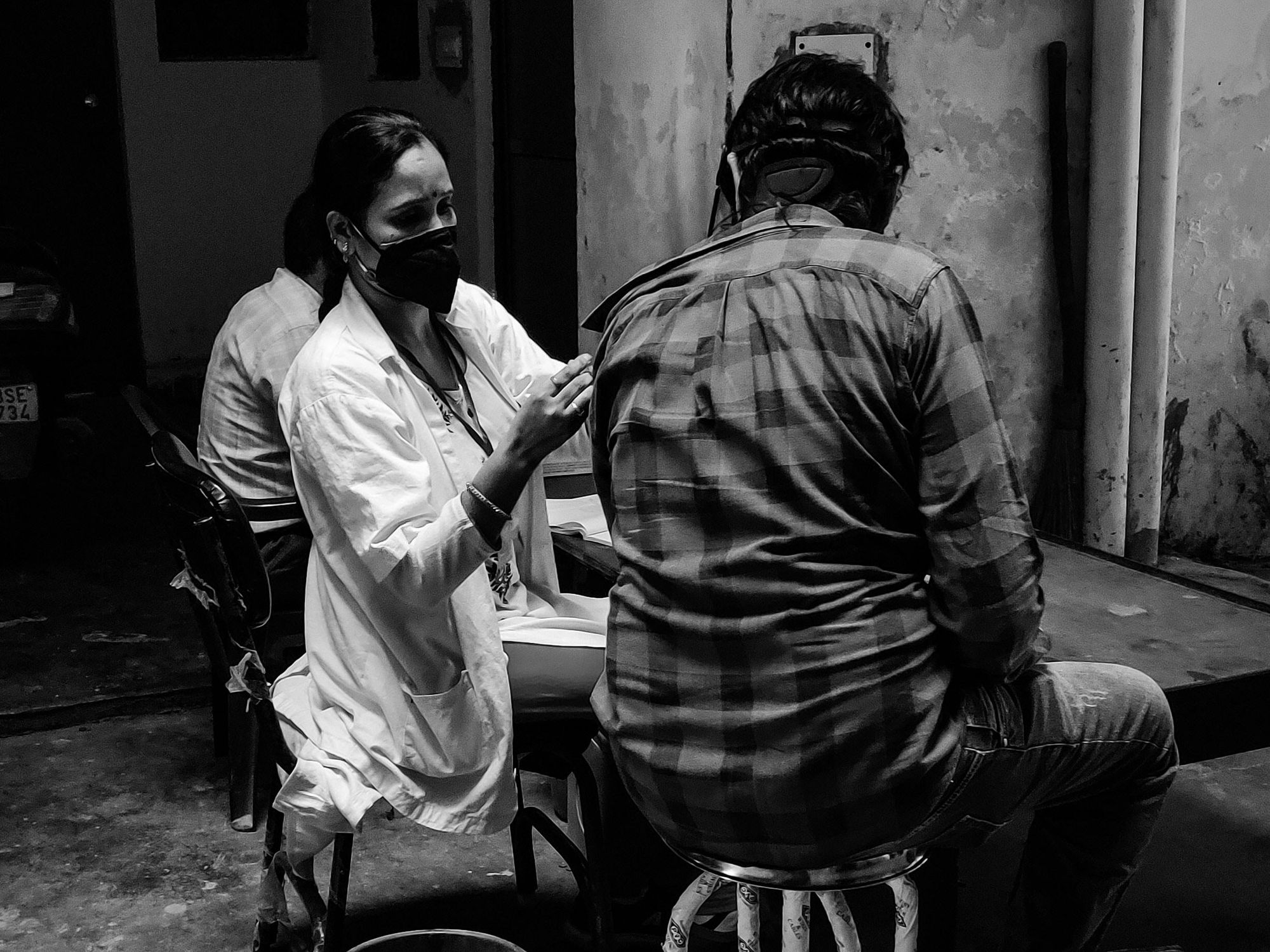Why we don’t have more COVID-19 vaccines for animals
COVID-19 vaccines for humans number 30, while only three vaccines are available for animals, even though many species have been infected.
Responding to COVID-19 outbreaks at more than 200 mink farms, the Danish government, in November 2020, culled its entire mink population. The Danish armed forces helped farmers slaughter each of their 17 million minks, which are normally farmed for their valuable fur.
The SARS-CoV-2 virus, said officials, spread from human handlers to the small, ferret-like animals, mutated, and then spread back to several hundred humans. Although the mass extermination faced much criticism, Denmark’s prime minister defended the decision last month, stating that the step was “necessary” and that the Danish government had “a responsibility for the health of the entire world.”
Over the past two and half years, COVID-19 infections have been reported in numerous animal species around the world. In addition to the Danish minks, there is other evidence that the virus can mutate as it’s transmitted back and forth between humans and animals, which increases the risk to public health. According to the World Health Organisation (WHO), COVID-19 vaccines for animals may protect the infected species and prevent the transmission of viral mutations. However, the development of such vaccines has been slow. Scientists attribute the deficiency to a lack of data.
“Several animal species have been predicted and found to be susceptible to SARS-CoV-2,” says Suresh V. Kuchipudi, interim director of the Animal Diagnostic Laboratory at the Huck Institutes of Life Sciences. But the risk remains unknown for many animals in several parts of the world, he says. “Therefore, there is an urgent need to monitor the SARS-CoV-2 exposure of high-risk animals in different parts of the world.”
In June, India introduced Ancovax, its first COVID-19 vaccine for animals. The development came a year after the nation reported that the virus had infected eight Asiatic lions, with two of them dying. While 30 COVID-19 vaccines for humans have been approved for general or emergency use across the world, Ancovax is only the third such vaccine for animals. The first, named Carnivac-Cov, was registered by Russia in March last year, followed by another vaccine four months later, developed by Zoetis, a U.S. pharmaceutical company.
Christina Lood, a Zoetis spokesperson, says the company has donated over 26,000 doses of its animal vaccine to over 200 zoos – in addition to 20 conservatories, sanctuaries and other animal organizations located in over a dozen countries, including Canada, Chile and the U.S. The vaccine, she adds, has been administered to more than 300 mammalian species so far.
“At least 75 percent of emerging infectious diseases have an animal origin, including COVID-19,” says Lood. “Now more than ever before, we can all see the important connection between animal health and human health."
The Dangers of COVID-19 Infections among Animals
Cases of the virus in animals have been reported in several countries across the world. As of March this year, 29 kinds of animals have been infected. These include pet animals like dogs, cats, ferrets and hamsters; farmed animals like minks; wild animals like the white-tailed deer, mule deer and black-tailed marmoset; and animals in zoos and sanctuaries, including hyenas, hippopotamuses and manatees. Despite the widespread infection, the U.S. Centres for Diseases Control and Prevention (CDC) has noted that “we don’t yet know all of the animals that can get infected,” adding that more studies and surveillance are needed to understand how the virus is spread between humans and animals.
Leyi Wang, a veterinary virologist at the Veterinary Diagnostic Laboratory, University of Illinois, says that captive and pet animals most often get infected by humans. It goes both ways, he says, citing a recent study in Hong Kong that found the virus spread from pet hamsters to people.
Wang’s bigger concern is the possibility that humans or domestic animals could transmit the virus back to wildlife, creating an uncontrollable reservoir of the disease, especially given the difficulty of vaccinating non-captive wild animals. Such spillbacks have happened previously with diseases such as plague, yellow-fever, and rabies.
It’s challenging and expensive to develop and implement animal vaccines, and demand has been lacking as the broader health risk for animals isn’t well known among the public. People tend to think only about their house pets.
In the past, other human respiratory viruses have proven fatal for endangered great apes like chimpanzees and gorillas. Fearing that COVID-19 could have the same effect, primatologists have been working to protect primates throughout the pandemic. Meanwhile, virus reservoirs have already been created among other animals, Wang says. “Deer of over 20 U.S. states were tested SARS-CoV-2 positive,” says Wang, pointing to a study that confirmed human-to-deer transmission as well as deer-to-deer transmission. It remains unclear how many wildlife species may be susceptible to the disease due to interaction with infected deer, says Wang.
In April, the CDC expressed concerns over new coronavirus variants mutating in wildlife, urging health authorities to monitor the spread of the contagion in animals as threats to humans. The WHO has made similar recommendations.
Challenges to Vaccine Development
Zoetis initiated development activities for its COVID-19 vaccine in February 2020 when the first known infection of a dog occurred in Hong Kong. The pharmaceutical giant completed the initial development work and studies on dogs and cats, and shared their findings at the World One Health Congress in the fall of 2020. A few months later, after a troop of eight gorillas contracted the virus at the San Diego Zoo Safari Park, Zoetis donated its experimental vaccine for emergency use in the great ape population.
Zoetis has uniquely formulated its COVID-19 vaccine for animals. It uses the same antigen as human vaccines, but it includes a different type of carrier protein for inducing a strong immune response. “The unique combination of antigen and carrier ensures safety and efficacy for the species in which a vaccine is used,” says Lood.
But it’s challenging and expensive to develop and implement animal vaccines, and demand has been lacking as the broader health risk for animals isn’t well known among the public. People tend to think only about their house pets. “As it became apparent that risk of severe disease for household pets such as cats and dogs was low, demand for those vaccines decreased before they became commercially available,” says William Karesh, executive vice-president for health and policy at EcoHealth Alliance. He adds that in affected commercial mink farms, the utility of a vaccine could justify the cost in some cases.
Although scientists have made tremendous advances in making vaccines for animals, Kuchipudi thinks that the need for COVID-19 vaccines for animals “must be evaluated based on many factors, including the susceptibility of the particular animal species, health implications, and cost.”.
Not every scientist feels the need for animal vaccines. Joel Baines, a professor of virology at Cornell University’s Baker Institute for Animal Health, says that while domestic cats are the most susceptible to COVID-19, they usually suffer mild infections. Big cats in zoos are vulnerable, but they can be isolated or distanced from humans. He says that mink farms are a relatively small industry and, by ensuring that human handlers are COVID negative, such outbreaks can be curtailed.
Baines also suggests that human vaccines could probably work in animals, as they were tested in animals during early clinical trials and induced immune responses. “However, these vaccines should be used in humans as a priority and it would be unethical to use a vaccine meant for humans to vaccinate an animal if vaccine doses are at all limiting,” he says.

William Karesh, president of the World Animal Health Organization Working Group on Wildlife Diseases, says the best way to protect animals is to reduce their exposure to infected people.
William Karesh
In the absence of enough vaccines, Karesh says that the best way to protect animals is the same as protecting unvaccinated humans - reduce their exposure to infected people by isolating them when necessary. “People working with or spending time with wild animals should follow available guidelines, which includes testing themselves and wearing PPE to avoid accidentally infecting wildlife,” he says.
The Link between Animal and Human Health
Although there is a need for animal vaccines in response to virus outbreaks, the best approach is to try to prevent the outbreaks in the first place, explains K. Srinath Reddy, president of the Public Health Foundation of India. He says that the incidence of zoonotic diseases has increased in the past six decades because human actions like increased deforestation, wildlife trade and animal meat consumption have opened an ecological window for disease transmission between humans and animals. Such actions chip away at the natural barriers between humans and forest-dwelling viruses, while building conveyor belts for the transmission of zoonotic diseases like COVID-19.
Many studies suggest that the source of COVID-19 was infected live animals sold at a wet market in China’s Wuhan. The market sold live dogs, rats, porcupines, badgers, hares, foxes, hedgehogs, marmots and Chinese muntjac (small deer) and, according to a study published in July, the virus was found on the market’s stalls, animal cages, carts and water drains.
This research strongly suggests that COVID-19 is a zoonotic disease, one that jumps from animals to humans due to our close relationship with them in agriculture, as companions and in the natural environment. Half of the infectious diseases that affect people come from animals, but the study of zoonotic diseases has been historically underfunded, even as they can reduce the likelihood and cost of future pandemics.
“We need to invest in vaccines,” says Reddy, “but that cannot be a substitute for an ecologically sensible approach to curtailing zoonotic diseases.”
Employers can create a culture of “Excellence From Anywhere” to reduce the risk of inequality among office-centric, hybrid, and fully remote employees.
COVID-19 prompted numerous companies to reconsider their approach to the future of work. Many leaders felt reluctant about maintaining hybrid and remote work options after vaccines became widely available. Yet the emergence of dangerous COVID variants such as Omicron has shown the folly of this mindset.
To mitigate the risks of new variants and other public health threats, as well as to satisfy the desires of a large majority of employees who express a strong desire in multiple surveys for a flexible hybrid or fully remote schedule, leaders are increasingly accepting that hybrid and remote options represent the future of work. No wonder that a February 2022 survey by the Federal Reserve Bank of Richmond showed that more and more firms are offering hybrid and fully-remote work options. The firms expect to have more remote workers next year and more geographically-distributed workers.
Although hybrid and remote work mitigates public health risks, it poses another set of health concerns relevant to employee wellbeing, due to the threat of proximity bias. This term refers to the negative impact on work culture from the prospect of inequality among office-centric, hybrid, and fully remote employees.
The difference in time spent in the office leads to concerns ranging from decreased career mobility for those who spend less facetime with their supervisor to resentment building up against the staff who have the most flexibility in where to work. In fact, a January 2022 survey by the company Slack of over 10,000 knowledge workers and their leaders shows that proximity bias is the top concern – expressed by 41% of executives - about hybrid and remote work.
To address this problem requires using best practices based on cognitive science for creating a culture of “Excellence From Anywhere.” This solution is based on guidance that I developed for leaders at 17 pioneering organizations for a company culture fit for the future of work.
Protect from proximity bias via the "Excellence From Anywhere" strategy
So why haven’t firms addressed the obvious problem of proximity bias? Any reasonable external observer could predict the issues arising from differences of time spent in the office.
Unfortunately, leaders often fail to see the clear threat in front of their nose. You might have heard of black swans: low-probability, high-impact threats. Well, the opposite kind of threats are called gray rhinos: obvious dangers that we fail to see because of our mental blindspots. The scientific name for these blindspots is cognitive biases, which cause leaders to resist best practices in transitioning to a hybrid-first model.
The core idea is to get all of your workforce to pull together to achieve business outcomes: the location doesn’t matter.
Leaders can address this by focusing on a shared culture of “Excellence From Anywhere.” This term refers to a flexible organizational culture that takes into account the nature of an employee's work and promotes evaluating employees based on task completion, allowing remote work whenever possible.
Addressing Resentments Due to Proximity Bias
The “Excellence From Anywhere” strategy addresses concerns about treatment of remote workers by focusing on deliverables, regardless of where you work. Doing so also involves adopting best practices for hybrid and remote collaboration and innovation.
By valuing deliverables, collaboration, and innovation through a focus on a shared work culture of “Excellence From Anywhere,” you can instill in your employees a focus on deliverables. The core idea is to get all of your workforce to pull together to achieve business outcomes: the location doesn’t matter.
This work culture addresses concerns about fairness by reframing the conversation to focus on accomplishing shared goals, rather than the method of doing so. After all, no one wants their colleagues to have to commute out of spite.
This technique appeals to the tribal aspect of our brains. We are evolutionarily adapted to living in small tribal groups of 50-150 people. Spending different amounts of time in the office splits apart the work tribe into different tribes. However, cultivating a shared focus on business outcomes helps mitigate such divisions and create a greater sense of unity, alleviating frustrations and resentments. Doing so helps improve employee emotional wellbeing and facilitates good collaboration.
Solving the facetime concerns of proximity bias
But what about facetime with the boss? To address this problem necessitates shifting from the traditional, high-stakes, large-scale quarterly or even annual performance evaluations to much more frequent weekly or biweekly, low-stakes, brief performance evaluation through one-on-one in-person or videoconference check-ins.
Supervisees agree with their supervisor on three to five weekly or biweekly performance goals. Then, 72 hours before their check-in meeting, they send a brief report, under a page, to their boss of how they did on these goals, what challenges they faced and how they overcame them, a quantitative self-evaluation, and proposed goals for next week. Twenty-four hours before the meeting, the supervisor responds in a paragraph-long response with their initial impressions of the report.
It’s hard to tell how much any employee should worry about not being able to chat by the watercooler with their boss: knowing exactly where they stand is the key concern for employees, and they can take proactive action if they see their standing suffer.
At the one-on-one, the supervisor reinforces positive aspects of performance and coaches the supervisee on how to solve challenges better, agrees or revises the goals for next time, and affirms or revises the performance evaluation. That performance evaluation gets fed into a constant performance and promotion review system, which can replace or complement a more thorough annual evaluation.
This type of brief and frequent performance evaluation meeting ensures that the employee’s work is integrated with efforts by the supervisor’s other employees, thereby ensuring more unity in achieving business outcomes. It also mitigates concerns about facetime, since all get at least some personalized attention from their team leader. But more importantly, it addresses the underlying concerns about career mobility by giving all staff a clear indication of where they stand at all times. After all, it’s hard to tell how much any employee should worry about not being able to chat by the watercooler with their boss: knowing exactly where they stand is the key concern for employees, and they can take proactive action if they see their standing suffer.
Such best practices help integrate employees into a work culture fit for the future of work while fostering good relationships with managers. Research shows supervisor-supervisee relationships are the most critical ones for employee wellbeing, engagement, and retention.
Conclusion
You don’t have to be the CEO to implement these techniques. Lower-level leaders of small rank-and-file teams can implement these shifts within their own teams, adapting their culture and performance evaluations. And if you are a staff member rather than a leader, send this article to your supervisor and other employees at your company: start a conversation about the benefits of addressing proximity bias using such research-based best practices.
Scientists at Baylor College of Medicine developed a vaccine called Corbevax that, unlike mRNA vaccines, can be mass produced using technology already in place in low- and middle-income countries. It's now being administered in India to children aged 12-14.
When the COVID-19 pandemic began invading the world in late 2019, Peter Hotez and Maria Elena Bottazzi set out to create a low-cost vaccine that would help inoculate populations in low- and middle-income countries. The scientists, with their prior experience of developing inexpensive vaccines for the world’s poor, had anticipated that the global rollout of Covid-19 jabs would be marked with several inequities. They wanted to create a patent-free vaccine to bridge this gap, but the U.S. government did not seem impressed, forcing the researchers to turn to private philanthropies for funds.
Hotez and Bottazzi, both scientists at the Texas Children’s Hospital Center for Vaccine Development at Baylor College of Medicine, raised about $9 million in private funds. Meanwhile, the U.S. government’s contribution stood at $400,000.
“That was a very tough time early on in the pandemic, you know, trying to do the work and raise the money for it at the same time,” says Hotez, who was nominated in February for a Nobel Peace Prize with Bottazzi for their COVID-19 vaccine. He adds that at the beginning of the pandemic, governments emphasized speed, innovation and rapidly immunizing populations in North America and Europe with little consideration for poorer countries. “We knew this [vaccine] was going to be the answer to global vaccine inequality, but I just wish the policymakers had felt the same,” says Hotez.
Over the past two years, the world has witnessed 488 million COVID-19 infections and over 61 million deaths. Over 11 billion vaccine doses have been administered worldwide; however, the global rollout of COVID-19 vaccines is marked with alarming socio-economic inequities. For instance, 72 percent of the population in high-income countries has received at least one dose of the vaccine, whereas the number stands at 15 percent in low-income countries.
This inequity is worsening vulnerabilities across the world, says Lawrence Young, a virologist and co-lead of the Warwick Health Global Research Priority at the UK-based University of Warwick. “As long as the virus continues to spread and replicate, particularly in populations who are under-vaccinated, it will throw up new variants and these will remain a continual threat even to those countries with high rates of vaccination,” says Young, “Therefore, it is in all our interests to ensure that vaccines are distributed equitably across the world.”
“When your house is on fire, you don't call the patent attorney,” says Hotez. “We wanted to be the fire department.”
The vaccine developed by Hotez and Bottazzi recently received emergency use authorisation in India, which plans to manufacture 100 million doses every month. Dubbed ‘Corbevax’ by its Indian maker, Biological E Limited, the vaccine is now being administered in India to children aged 12-14. The patent-free arrangement means that other low- and middle-income countries could also produce and distribute the vaccine locally.
“When your house is on fire, you don't call the patent attorney, you call the fire department,” says Hotez, commenting on the intellectual property rights waiver. “We wanted to be the fire department.”
The Inequity
Vaccine equity simply means that all people, irrespective of their location, should have equal access to vaccines. However, data suggests that the global COVID-19 vaccine rollout has favoured those in richer countries. For instance, high-income countries like the UAE, Portugal, Chile, Singapore, Australia, Malta, Hong Kong and Canada have partially vaccinated over 85 percent of their populations. This percentage in poorer countries, meanwhile, is abysmally low – 2.1 percent in Yemen, 4.6 in South Sudan, 5 in Cameroon, 9.9 in Burkina Faso, 10 in Nigeria, 12 in Somalia, 12 in Congo, 13 in Afghanistan and 21 in Ethiopia.

In late 2019, scientists Peter Hotez and Maria Elena Bottazzi set out to create a low-cost vaccine that would help inoculate populations in low- and middle-income countries. In February, they were nominated for a Nobel Peace Prize.
Texas Children's Hospital
The COVID-19 vaccination coverage is particularly low in African countries, and according to Shabir Madhi, a vaccinologist at the University of the Witwatersrand, Johannesburg and co-director of African Local Initiative for Vaccinology Expertise, vaccine access and inequity remains a challenge in Africa. Madhi adds that a lack of vaccine access has affected the pandemic’s trajectory on the continent, but a majority of its people have now developed immunity through natural infection. “This has come at a high cost of loss of lives,” he says.
COVID-19 vaccines mean a significant financial burden for poorer countries, which spend an average of $41 per capita annually on health, while the average cost of every COVID-19 vaccine dose ranges between $2 and $40 in addition to a distribution cost of $3.70 per person for two doses. In December last year, the World Health Organisation (WHO) set a goal of immunizing 70 percent of the population of all countries by mid-2022. This, however, means that low-income countries would have to increase their health expenditure by an average of 56.6 percent to cover the cost, as opposed to 0.8 per cent in high-income countries.
Reflecting on the factors that have driven global inequity in COVID-19 vaccine distribution, Andrea Taylor, assistant director of programs at the Duke Global Health Innovation Center, says that wealthy nations took the risk of investing heavily in the development and scaling up of COVID-19 vaccines – at a time when there was little evidence to show that vaccines would work. This reserved a place for these nations at the front of the queue when doses started rolling off production lines. Lower-income countries, meanwhile, could not afford such investments.
“Now, however, global supply is not the issue,” says Taylor. “We are making plenty of doses to meet global need. The main problem is infrastructure to get the vaccine where it is most needed in a predictable and timely way and to ensure that countries have all the support they need to store, transport, and use the vaccine once it is received.”

Taufique Joarder, vice-chairperson of Bangladesh's Public Health Foundation, sees the need for more trials and data before Corbevax is made available to the general population.
In addition to global inequities in vaccination coverage, there are inequities within nations. Taufique Joarder, vice-chairperson of Bangladesh’s Public Health Foundation, points to the situation in his country, where vaccination coverage in rural and economically disadvantaged communities has suffered owing to weak vaccine-promotion initiatives and the difficulty many people face in registering online for jabs.
Joarder also cites the example of the COVID-19 immunization drive for children aged 12 years and above. “[Children] are given the Pfizer vaccine, which requires an ultralow temperature for storage. This is almost impossible to administer in many parts of the country, especially the rural areas. So, a large proportion of the children are being left out of vaccination,” says Joarder, adding that Corbevax, which is cheaper and requires regular temperature refrigeration “can be an excellent alternative to Pfizer for vaccinating rural children.”
Corbevax vs. mRNA Vaccines
As opposed to most other COVID-19 vaccines, which use the new Messenger RNA (mRNA) vaccine technology, Corbevax is an “old school” vaccine, says Hotez. The vaccine is made through microbial fermentation in yeast, similar to the process used to produce the recombinant hepatitis B vaccine, which has been administered to children in several countries for decades. Hence, says Hotez, the technology to produce Corbevax at large scales is already in place in countries like Vietnam, Bangladesh, India, Indonesia, Brazil, Argentina, among many others.
“So if you want to rapidly develop and produce and empower low- and middle-income countries, this is the technology to do it,” he says.
“Global access to high-quality vaccines will require serious investment in other types of COVID-19 vaccines," says Andrea Taylor.
The COVID-19 vaccines created by Pfizer-BioNTech and Moderna marked the first time that mRNA vaccine technology was approved for use. However, scientists like Young feel that there is “a need to be pragmatic and not seduced by new technologies when older, tried and tested approaches can also be effective.” Taylor, meanwhile, says that although mRNA vaccines have dominated the COVID-19 vaccine market in the U.S., “there is no clear grounding for this preference in the data we have so far.” She adds that there is also growing evidence that the immunity from these shots may not hold up as well over time as that of vaccines using different platforms.
“The mRNA vaccines are well suited to wealthy countries with sufficient ultra-cold storage and transportation infrastructure, but these vaccines are divas and do not travel well in the rest of the world,” says Taylor. “Global access to high-quality vaccines will require serious investment in other types of COVID-19 vaccines, such as the protein subunit platform used by Novavax and Corbevax. These require only standard refrigeration, can be manufactured using existing facilities all over the world, and are easy to transport.”
Joarder adds that Corbevax is cheaper due to the developers’ waived intellectual rights. It could also be used as a booster vaccine in Bangladesh, where only five per cent of the population has currently received booster doses. “If this vaccine is proved effective for heterologous boosting, [meaning] it works well and is well tolerated as a booster with other vaccines that are available in Bangladesh, this can be useful,” says Joarder.
According to Hotez, Corbevax can play several important roles - as a standalone adult or paediatric vaccine, and as a booster for other vaccines. Studies are underway to determine Corbevax’s effectiveness in these regards, he says.
Need for More Data
Biological E conducted two clinical trials involving 3000 subjects in India, and found Corbevax to be “safe and immunogenic,” with 90 percent effectiveness in preventing symptomatic infections from the original strain of COVID-19 and over 80 percent effectiveness against the Delta variant. The vaccine is currently in use in India, and according to Hotez, it’s in the pipeline at different stages in Indonesia, Bangladesh and Botswana.
However, Corbevax is yet to receive emergency use approval from the WHO. Experts such as Joarder see the need for more trials and data before it is made available to the general population. He says that while the WHO’s emergency approval is essential for global scale-up of the vaccine, we need data to determine age-stratified efficacy of the vaccine and whether it can be used for heterologous boosting with other vaccines. “According to the most recent data, the 100 percent circulating variant in Bangladesh is Omicron. We need to know how effective is Corbevax against the Omicron variant,” says Joarder.

Shabir Madhi, a vaccinologist at the University of the Witwatersrand, Johannesburg and co-director of the African Local Initiative for Vaccinology Expertise, says that a majority of people in Africa have now developed immunity through natural infection. “This has come at a high cost of loss of lives."
Shivan Parusnath
Others, meanwhile, believe that availing vaccines to poorer countries is not enough to resolve the inequity. Young, the Warwick virologist, says that the global vaccination rollout has also suffered from a degree of vaccine hesitancy, echoing similar observations by President Biden and Pfizer’s CEO. The problem can be blamed on poor communication about the benefits of vaccination. “The Corbevax vaccine [helps with the issues of] patent protection, vaccine storage and distribution, but governments need to ensure that their people are clearly informed.” Notably, however, some research has found higher vaccine willingness in lower-income countries than in the U.S.
Young also emphasized the importance of establishing local vaccination stations to improve access. For some countries, meanwhile, it may be too late. Speaking about the African continent, Madhi says that Corbevax has arrived following the peak of the crisis and won’t reverse the suffering and death that has transpired because of vaccine hoarding by high-income countries.
“The same goes for all the sudden donations from countries such as France - pretty much of little to no value when the pandemic is at its tail end,” says Madhi. “This, unfortunately, is a repeat of the swine flu pandemic in 2009, when vaccines only became available to Africa after the pandemic had very much subsided.”


